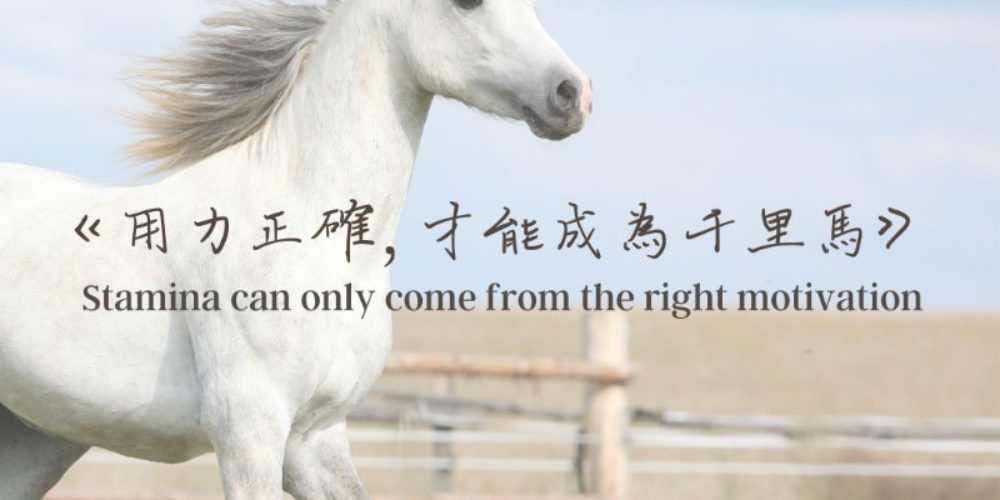From a young age, we have been taught to use the correct force when lifting heavy objects to prevent hurting our backs.
But in fact, we also need the right force for work every day since using the wrong force will harm our bodies and mind.
Where does our driving force (motivation) for work come from?
Emotion serves as the main driving force behind our behaviour with “E” driving the “motion”. If an action can bring forward positive emotions, the motivation for repeating the same action will be reinforced. Dolphins in a marine park, for instance, perform leaping in and out of the water day after day. Such behaviour is reinforced because the dolphins will be fed with fish every time they repeat the performance. Being fed, the dolphins experience positive emotions and the motivation for performing the same act again is strengthened. There is also another way through which motivations can be reinforced: If the result of a behaviour is a reduction of negative emotions, this result will also drive us to perform the same behaviour again. For example, a circus tiger would stand on its feet according to the tamer’s instructions even when no steak is given as a reward; yet why does the tiger still oblige? By obeying the tamer, the tiger can avoid being whipped, a process during which a painful experience will naturally occur. Therefore, the act of standing reduces the negative emotions that are inflicted by the punishments.
Think about this: What type of force drives you to complete a task? Do you feel positive emotions after completing the task, including feeling satisfied or capable, or are you simply completing a task to avoid feeling negative emotions, such as shame, humiliation, fear of punishment, and the fear of losing your livelihood?
The same behaviour can be motivated by acquiring positive emotions or by eliminating negative emotions. For the former, I see it as a good motivation, whereas the latter is bad.
Why is the latter considered a bad driving force? In the long run, if our everyday motivation stems only from our attempt of evading painful feeling, the process will be like engraving negative words about ourselves in our mind, such as “I am incompetent”, “I will always be a slave in my life”, “life is an endless escape”, and so on. In the long run, it will even give rise to world-weary thoughts.
We have to be especially wary of bad motivations. Bad motivations are immensely powerful and seem to work so well. Imagine under which circumstance people tend to run faster. (1) A fire has broken out behind, and (2) someone at the front is giving out a gift. The impulse to escape from the fire will certainly be far stronger than the motivation to pursue the gift. If we, however, cannot resist the temptation and get used to succumbing to the bad motivation day after day, the cost in the long term can be fatal.
Let’s use good motivation every day. We pursue stamina, rather than some short-lived explosive power. Our stamina is based on grit – sustained effort is fueled by strong positive emotions, including pride, competence, accomplishment, and a sense of meaning. Whenever actions are driven by good motivations, positive thinking will be strengthened with ideas such as “I am capable”, “There are many meaningful things that I have yet to discover”, and “My efforts can make society progress and everyone’s life better”…etc.
Each of us should strive to use good motivation. How can this be done? First of all, you should always remind yourself that your work is meaningful albeit imperfect; try to view your work from a macro perspective, be it providing services (such as food and beverage, education, public services, etc.) or manufacturing products. How could society possibly function without your effort otherwise? Remind yourself – colleagues can also remind each other – daily of such thinking. At the same time, appreciate yourself from the bottom of your heart every day. Moreover, receive every word of thanks as genuine gratitude. Do not treat them as expressions merely out of courtesy. Try placing yourself in your client’s shoes – when you finally receive the mail that you have been waiting for or the kind of service that you need, you will also be able to acknowledge the importance and meaning within, right?
Starting from today, strive to seek good motivation and cultivate the stamina to achieve your life goals. Your perseverance can instill the people around you with positive energy.
For more information regarding the topic of mental health, please visit our Foundation Mental Health Information Platform.
Acknowledgements:
Supported by the Jebsen Group Charitable Fund
Psychiatry Specialist Dr. Chui Wing Ho


